Congratulations to the six winners of the ACM Student Research Competition (ACM SRC). ACM SRC is an internationally recognized contest where undergraduate and graduate students present their original research at technical conferences around the world. The Grace Hopper Celebration Poster Committee selected 23 students out of 157 applications to participate in this competition at GHC 18. A panel of judges then selected three undergraduate students and three graduate students as the winners, all of whom received a cash prize and a medal from ACM for their incredible work. The first place undergraduate student and first place graduate student will also advance to the ACM SRC Grand Finals to be held in 2019.
“We are proud to recognize the GHC 18 ACM Student Research Competition winners here today,” announced Jodi Tims, Chair of ACM-W, the organization’s Council on Women in Computing, during the GHC 18 Closing Keynote. Learn more about the six winners and their research:
Undergraduate Winners
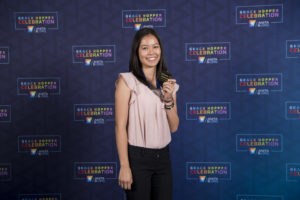 1st Place – Valerie Chen, Yale University
1st Place – Valerie Chen, Yale University
Poster Title: Experimental Multi-Party Computation on Real Data Using SPDZ
Secure Multi-Party Computation (MPC) is an area of cryptography research that has the power to revolutionize computation between shared parties holding private data. However, MPC protocols are often not scalable to real world applications. In her research project, Valerie investigates an MPC protocol called SPDZ against two other protocols in machine learning and regression applications. She demonstrates its potential to be used in real world applications with rigorous experiments on real world data.
Valerie was thrilled to present her poster at GHC 18. “Since this was my first poster presentation, I didn’t know what to expect going in,” she told us. “But I found the experience extremely rewarding because I had the opportunity to talk about my research, possible related directions, and ideas with so many different people.”
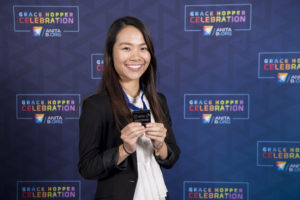 2nd Place – Tram Nguyen, Stetson University
2nd Place – Tram Nguyen, Stetson University
Poster Title: Towards Detecting “Fake News” by Propagating Bias Through a Network of Linked Assertions
Due to the recent surge of fake news, Tram proposed a software system to help users better identify unreliable news. The system processes a collection of news stories and examines assertions made in each piece against other articles. Tram built her assertions extraction model and utilized the Bilateral Multi-Perspective Matching software by Wang, Hamza, & Florian (2017) to calculate entailment between articles and form an assertion network. “With this network,” Tram explained, “we hope to help others better detect fake news.
“I had such a rewarding experience presenting our research project and winning second place in the undergraduate category,” Tram added. “While I am extremely grateful for this opportunity, I can’t stop thinking about the countless other women who have the same or better qualifications but don’t have the same opportunities that I do. Because of this, I feel more inspired to not only continue my research, but to also look for more ways to encourage more women to pursue fields within the STEM industry.”
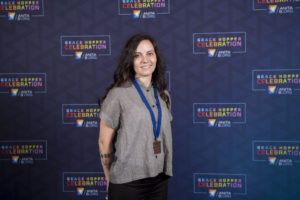 3rd Place – Tammy Lee, University of West Georgia
3rd Place – Tammy Lee, University of West Georgia
Poster Title: Scratch Hackathon for Teenagers
At computer science outreach programs, participants usually learn programming fundamentals, but not software engineering, a crucial part of software development. For her research project, Tammy developed a simple architectural pattern to implement animations with Scratch, a programming language, at a hackathon for teenagers. “The challenge was to animate a story about suicide and bullying prevention,” Tammy explained. “The teen participants grasped the software quickly and were able to construct projects with the proposed pattern.”
For Tammy, attending GHC 18 was an incredible experience that she recommends to all students. “GHC is such an empowering event that always leaves me feeling inspired after being surrounded by so many brilliant women who are changing the world of technology,” she told us.
Graduate Winners
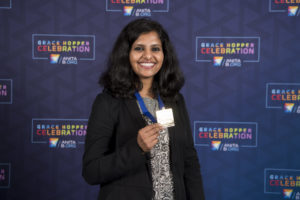 1st Place – Niveditha Kalavakonda, University of Washington – Seattle
1st Place – Niveditha Kalavakonda, University of Washington – Seattle
Poster Title: Robotic and Neurosurgical Instrument Segmentation for Development of Intelligent Surgical Assistant
In order to develop a truly successful Intelligent Surgical Assistant, scientists must ensure that the robot can consistently and confidently track surgical instruments during procedures. To achieve continuous tracking, an instrument segmentation algorithm was developed and tested on two surgical video datasets: robotic and neurosurgical instruments. With a goal of developing interpretable segmentation, Niveditha’s work sets a baseline by using hand-crafted features that extends between two different datasets.
For Niveditha, participating in the ACM SRC at GHC 18 was a very valuable experience. “[GHC] allows interactions with attendees from diverse computing backgrounds and industry/academia experience,” she explained, “and this facilitates diversity of thought about a problem.”
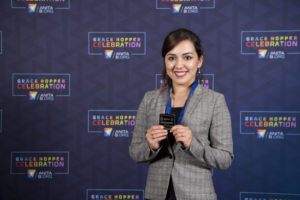 2nd Place – Zahra Shamsi, University of Illinois – Urbana-Champaign
2nd Place – Zahra Shamsi, University of Illinois – Urbana-Champaign
Poster Title: Intelligent Selection of Features Using Reinforcement Learning
Proteins are macromolecules, consisting of thousands of atoms performing important biological processes. Due to their complex nature, components, and interactions, their simulations take enormous amounts of computational power. To perform the simulations with biologically relevant timescales at a reasonable cost, Zahra has been using machine learning and, specifically, reinforcement learning techniques to enhance the simulation process and learn more from the protein dynamics with limited simulation data.
Zahra was impressed by just how many women from different regions and backgrounds attended GHC, as well as how many diverse sessions we offered at the Celebration. “There were too many things to learn,” she joked.
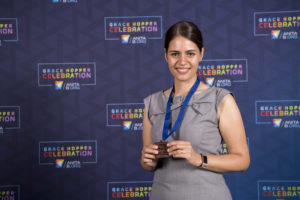 3rd Place – Negin Forouzesh, Virginia Tech
3rd Place – Negin Forouzesh, Virginia Tech
Poster Title: Finding Optimal Dielectric Boundary for Practical Continuum Solvent Calculations
Fast and accurate calculations of free energies are substantially important in many biomolecular applications, such as Computer Aided Drug Design. Accurate determination of dielectric boundary plays a key role in such calculations. In her research project, Negin runs a massively parallel deterministic global optimization to find the optimal dielectric boundary in terms of calculating solvation and protein-ligand binding free energies.
“Participating in the ACM SRC at GHC 18 was a great opportunity for me to present my research project and receive constructive feedback,” Negin said.
Congratulations to all our winners. We wish Valerie and Niveditha the best of luck as they move on to the finals.











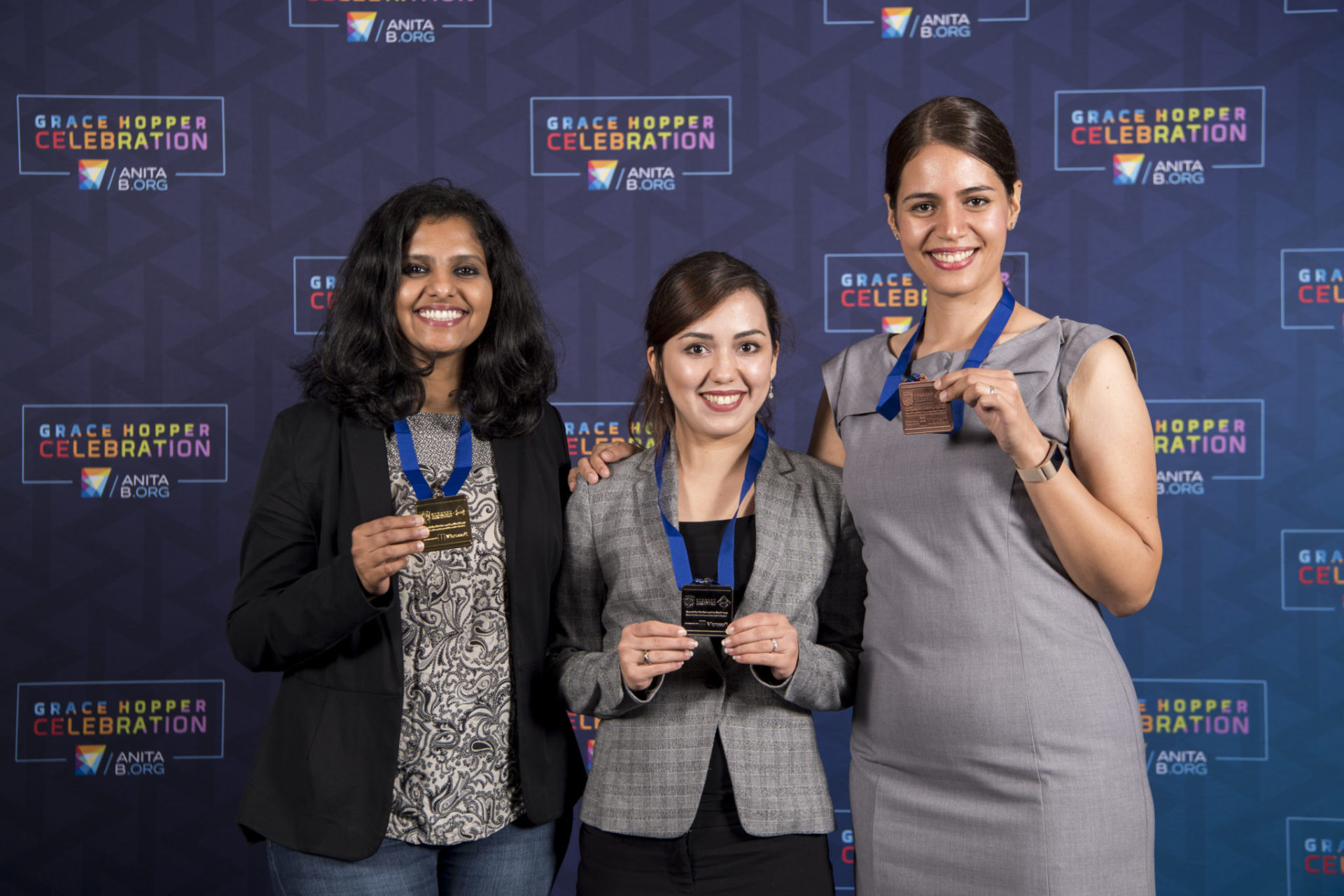
Leave a Reply
You must be logged in to post a comment.